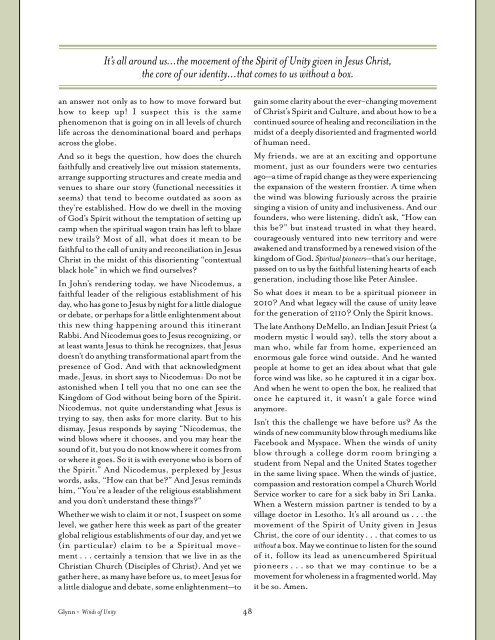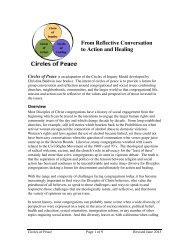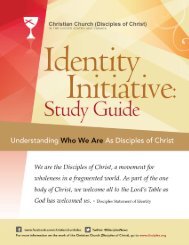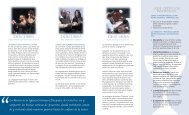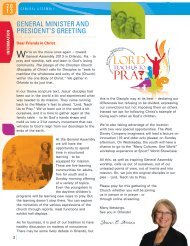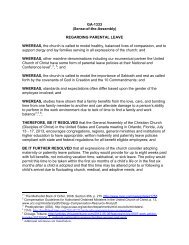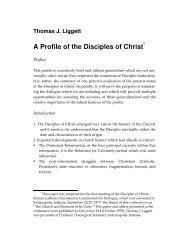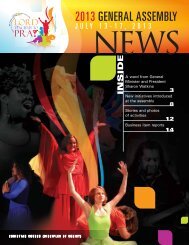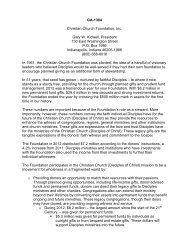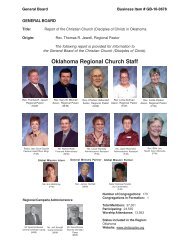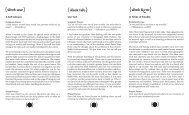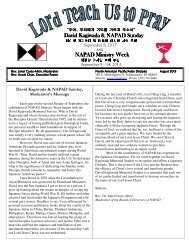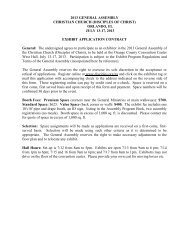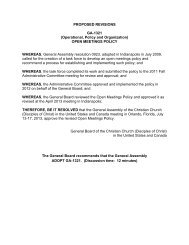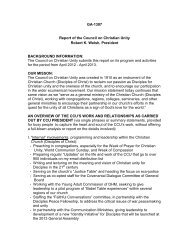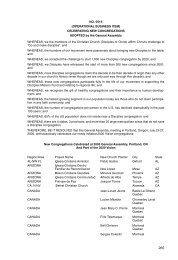RESOURCING THE CHURCH FOR ECUMENICAL MINISTRy A ...
RESOURCING THE CHURCH FOR ECUMENICAL MINISTRy A ...
RESOURCING THE CHURCH FOR ECUMENICAL MINISTRy A ...
You also want an ePaper? Increase the reach of your titles
YUMPU automatically turns print PDFs into web optimized ePapers that Google loves.
an answer not only as to how to move forward but<br />
how to keep up! I suspect this is the same<br />
phenomenon that is going on in all levels of church<br />
life across the denominational board and perhaps<br />
across the globe.<br />
And so it begs the question, how does the church<br />
faithfully and creatively live out mission statements,<br />
arrange supporting structures and create media and<br />
venues to share our story (functional necessities it<br />
seems) that tend to become outdated as soon as<br />
they’re established. How do we dwell in the moving<br />
of God’s Spirit without the temptation of setting up<br />
camp when the spiritual wagon train has left to blaze<br />
new trails? Most of all, what does it mean to be<br />
faithful to the call of unity and reconciliation in Jesus<br />
Christ in the midst of this disorienting “contextual<br />
black hole” in which we find ourselves?<br />
In John’s rendering today, we have Nicodemus, a<br />
faithful leader of the religious establishment of his<br />
day, who has gone to Jesus by night for a little dialogue<br />
or debate, or perhaps for a little enlightenment about<br />
this new thing happening around this itinerant<br />
Rabbi. And Nicodemus goes to Jesus recognizing, or<br />
at least wants Jesus to think he recognizes, that Jesus<br />
doesn’t do anything transformational apart from the<br />
presence of God. And with that acknowledgment<br />
made, Jesus, in short says to Nicodemus: Do not be<br />
astonished when I tell you that no one can see the<br />
Kingdom of God without being born of the Spirit.<br />
Nicodemus, not quite understanding what Jesus is<br />
trying to say, then asks for more clarity. But to his<br />
dismay, Jesus responds by saying “Nicodemus, the<br />
wind blows where it chooses, and you may hear the<br />
sound of it, but you do not know where it comes from<br />
or where it goes. So it is with everyone who is born of<br />
the Spirit.” And Nicodemus, perplexed by Jesus<br />
words, asks, “How can that be?” And Jesus reminds<br />
him, “You’re a leader of the religious establishment<br />
and you don’t understand these things?”<br />
Whether we wish to claim it or not, I suspect on some<br />
level, we gather here this week as part of the greater<br />
global religious establishments of our day, and yet we<br />
(in particular) claim to be a Spiritual movement<br />
. . . certainly a tension that we live in as the<br />
Christian Church (Disciples of Christ). And yet we<br />
gather here, as many have before us, to meet Jesus for<br />
a little dialogue and debate, some enlightenment—to<br />
Glynn • Winds of Unity<br />
It’s all around us...the movement of the Spirit of Unity given in Jesus Christ,<br />
the core of our identity...that comes to us without a box.<br />
48<br />
gain some clarity about the ever-changing movement<br />
of Christ’s Spirit and Culture, and about how to be a<br />
continued source of healing and reconciliation in the<br />
midst of a deeply disoriented and fragmented world<br />
of human need.<br />
My friends, we are at an exciting and opportune<br />
moment, just as our founders were two centuries<br />
ago—a time of rapid change as they were experiencing<br />
the expansion of the western frontier. A time when<br />
the wind was blowing furiously across the prairie<br />
singing a vision of unity and inclusiveness. And our<br />
founders, who were listening, didn’t ask, “How can<br />
this be?” but instead trusted in what they heard,<br />
courageously ventured into new territory and were<br />
awakened and transformed by a renewed vision of the<br />
kingdom of God. Spiritual pioneers—that’s our heritage,<br />
passed on to us by the faithful listening hearts of each<br />
generation, including those like Peter Ainslee.<br />
So what does it mean to be a spiritual pioneer in<br />
2010? And what legacy will the cause of unity leave<br />
for the generation of 2110? Only the Spirit knows.<br />
The late Anthony DeMello, an Indian Jesuit Priest (a<br />
modern mystic I would say), tells the story about a<br />
man who, while far from home, experienced an<br />
enormous gale force wind outside. And he wanted<br />
people at home to get an idea about what that gale<br />
force wind was like, so he captured it in a cigar box.<br />
And when he went to open the box, he realized that<br />
once he captured it, it wasn’t a gale force wind<br />
anymore.<br />
Isn’t this the challenge we have before us? As the<br />
winds of new community blow through mediums like<br />
Facebook and Myspace. When the winds of unity<br />
blow through a college dorm room bringing a<br />
student from Nepal and the United States together<br />
in the same living space. When the winds of justice,<br />
compassion and restoration compel a Church World<br />
Service worker to care for a sick baby in Sri Lanka.<br />
When a Western mission partner is tended to by a<br />
village doctor in Lesotho. It’s all around us . . . the<br />
movement of the Spirit of Unity given in Jesus<br />
Christ, the core of our identity . . . that comes to us<br />
without a box. May we continue to listen for the sound<br />
of it, follow its lead as unencumbered Spiritual<br />
pioneers . . . so that we may continue to be a<br />
movement for wholeness in a fragmented world. May<br />
it be so. Amen.


